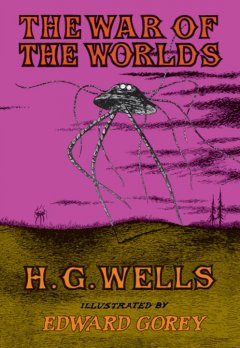Every January we discuss a classic novel that is always available in e-book format, to challenge ourselves with reading and technology. As much as most of us love the feel of a book, the ability to access our books on modern devices is increasingly acceptable and even desirable—particularly when it comes to reading in large print without holding a heavy book and reading in the dark. Plus, from our library’s viewpoint, it is the way of the future.
A week ago today, the Whitney Book Bistro met to discuss H.G. Wells’ War of the Worlds. Our first responder had put off reading the book until the last minute, dreading the gravity of the story, but she accepted the challenge (an assignment she took seriously!) and finished it just two hours before the meeting. She paused, “It was rather imaginative.”
Our first responder had put off reading the book until the last minute, dreading the gravity of the story, but she accepted the challenge (an assignment she took seriously!) and finished it just two hours before the meeting. She paused, “It was rather imaginative.”
Two of us had read The Complete War of the Worlds Book: Mars’ Invasion of Earth From H.G. Wells to Orson Welles (2001), which included a CD recording of Orson Welles 1938 radio broadcast, sharing details about that production as well. The hysteria created by Orson Welles’ broadcast is credited with cementing Wells’ story in history.
We discussed the language, vocabulary that was fascinating – from the use of wonderful[i]to archaic words that kept us looking in our dictionaries. I particularly liked phrases such as, “amidst the scattered splinters of a fir tree it had shivered to fragments in its descent” and “rhythmic shocks that had kept our ruinous refuge quivering.” Another liked the description of the British gung-ho approach to fighting the aliens. Some of us found the book depressing through the middle. We all laughed when one person mentioned Wells referring to the curate “as lacking in restraint as a silly woman,” and another answered with – “page 185!” One of us liked the narrator’s brother best, and we all wondered why Wells just dropped that character.
We discussed that science fiction has always been predictive, impressed that Wells imagined the future of warfare with tanks and gas and atomic bombs.[ii]One member who joined the discussion even though she hadn’t read the book said that the novel seemed like an “adult fairytale.” This was an apt description given Wells’ moralizing: “And before we judge of them [the Martians] too harshly we must remember what ruthless and utter destruction our own species has wrought.”
One of us likened the nightmares our narrator suffered to what we now call Post-Traumatic Stress Disorder (PTSD). We discussed how reality mirrors our reading, such as the recent headlines about the explosion in New York City that turned the sky blue, prompting people to fear an alien invasion.[iii] Another member voiced what many of us feel, which is that our news today is unreliable. News used to seem credible. Walter Cronkite. Tom Brokaw. Who can we trust now? Which led to a discussion of other books we have read, particularly a book club favorite, Destiny of the Republic. Sometimes, books remind us how little things change.
As usual, we discussed more than this. Wonderful things. Mundane[iv]things. Contradictory things. In my research for this discussion I was both impressed and appalled by what I learned about H.G. Wells. All because of this group. Sometimes it’s work, sometimes it’s play, always it’s worth it.
- OTHER WORKS DISCUSSED:
- Authors
- H.P. Lovecraft (1890-1937)
- Jules Verne (1828-1905)
- Books
- Dragon’s Egg(1980) by Robert Forward
- Destiny of the Republic(2011) by Candice Millard
- The Word for World is Forest(1972) by Ursula K. LeGuin
- Film
- Catch Me If You Can(2002)
- Mentioned prior to the discussion
- The Warner Boys: Our Family’s Story of Autism and Hope(2018) by Ana and Curt Warner
- The Collector’s Apprentice (2018) by B.A. Shapiro
- Website links
- Mars and Martian Mania: a history https://www.history.com/news/mars-and-martian-mania-a-brief-history
- The World According to Wells by Joel Achenbach. Smithsonian, Apr. 2001, p. 110.
- https://www.smithsonianmag.com/history/the-world-according-to-wells-73978524/
- Writing the Future: a timeline of science fiction literatureby BBC consultant Dr. Caroline Edward Birbeck https://www.bbc.com/timelines/zp7dwmn
ENDNOTES:
War of the Worlds quoted here is the Ibook, Inc., 2002 edition, kindle version
[i]“The early morning was wonderfully still.”
[ii]“HG Wells first imagined a uranium-based hand grenade that “would continue to explode indefinitely” in his 1914 novel The World Set Free.” “Was HG Wells the First to Think of the Atom Bomb?” BBC News, BBC, 4 July 2015, http://www.bbc.com/news/magazine-33365776.
[iii]“New York Sky Turns Bright Blue After Transformer Explosion.” By Matt Stevens, Rick Rojas and Jacey Fortin.New York Times, 28 December 2018, http://www.nytimes.com/2018/12/27/nyregion/blue-sky-queens-explosion.html
[iv]adjective
- common; ordinary; banal; unimaginative.
- of or relating to this world or earth as contrasted with heaven; worldly; earthly:mundane affairs.
- of or relating to the world, universe, or earth.
“Mundane.” Dictionary.com, Dictionary.com, http://www.dictionary.com/browse/mundane. Based on the Random House Unabridged Dictionary, © Random House, Inc. 2019
